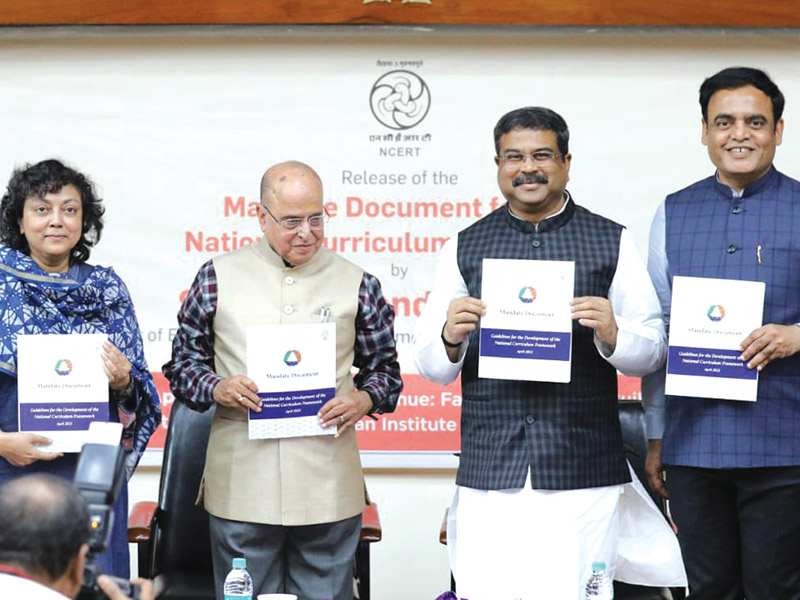Autar Nehru (Delhi)
India is headed for a sweeping reorganisation of its school system in the next few years. The 628-page draft National Curriculum Framework for School Education (NCF-SE) made public on April 6, based on the National Education Policy (NEP) 2020, offers ample evidence of the impending overhaul. The NCF-SE draft has been placed in the public domain for feedback and suggestions from all stakeholders without a deadline and also circulated to state governments for their views.
The expectation within the Union education ministry is that NCF-SE will move closer to finality within the next three-four months and new textbooks will be written for the academic year 2024-25. The latter process has already begun with history textbooks authorised by NCERT — a subsidiary of the Union education ministry — which have omitted the entire Mughal period (1526-1857), having already generated massive controversy.
Undoubtedly there are several positive features in NEP 2020 including the formalisation of early childhood education, inclusion of vocational education and promotion of critical thinking in lieu of rote learning, in school education. The Steering Committee for implementing NEP 2020, chaired by the indefatigable Dr. K. Kasturirangan, has already completed the NCF-FS (foundational stage) made public last October to universal acclamation. Now it is working on NCF-SE which will be followed by detailed implementation manuals for NCF-TE (teacher education) and NCF-AE (adult education).
The recently completed draft NCF-SE is an exhaustive and detailed document of 628 pages which provides a road-map for seamless integration of 13 curricular goals for transforming school education in all its stages. This draft will be supplemented by manuals written by 25 focus groups and a consultative process.
In a statement accompanying release of the draft NCF-SE for public scrutiny, the ministry of education says: “Given the diverse needs of students, multiple pedagogic approaches, learning-teaching material at the different stages of school education, it is felt important to take feedback from students, parents, teachers, teacher educators, experts, scholars and professionals on the various sections and recommendations of this NCF-School Education. While giving your feedback, it needs to be kept in view that this is a pre-draft of the NCF-SE which still requires several rounds of discussion within the National Steering Committee (NSC). Feedback from diverse stakeholders will further help NSC to look critically into different modalities and approaches that this framework is proposing.”
Although the voluminous reports and deeply detailed NEP 2020 implementation manuals produced after the Kasturirangan Committee’s 484-page report was translated in the 60-page NEP 2020 and the production of the 360-page NCF-FS (foundational stage) report followed by the 628-page NCF-SE report to be followed by 10 implementation volumes reflect well on Dr. Kasturirangan’s enthusiasm and attention to detail, it raises questions of over-centralisation and prolixity. Not a few educationists wonder about implementation time lines and who will read these detailed reports and volumes.
“NCF 2005 was also finalised by 10 focus groups which produced excellent implementation reports. But the point is very few principals and teachers bothered to read them, let alone implement them. That’s why despite these excellent reports and implementation manuals, learning outcomes in primary education remain poor as testified by the Annual Status of Education Reports (ASER) of the authoritative Pratham Education Foundation. Other surveys also indicate that learning outcomes of India’s children are deteriorating. So quite obviously these lengthy reports and detailed implementation roadmaps don’t work,” says the principal of an upscale CISCE-affiliated school in Delhi.
This over centralisation and micro-management of big ticket reforms envisaged in the 628-page NCF-SE may prove a hindrance rather than help to school principals and teachers in the implementation process. “It’s highly doubtful if educators will read the NCF-SE draft to provide useful feedback. Moreover, the subject implementation manuals should be provided in bullet-point format and written in succinct language. They should be written with teachers — rather than intellectuals — in mind. Otherwise, NCF-SE and focus group manuals will be another case of love’s labour lost,” warns Pramod Sharma, former principal of the top-ranked Mayo College, Ajmer and Genesis World School, and currently a Delhi-based education consultant.
Moreover, it’s pertinent to note that after the detailed policy implementation manuals are finalised, instead of the job of implementing them being entrusted to school boards, principals and SMCs (School Management Committees). NEP mandates several regulatory official boards — RSA, SEC, SSA to supervise schools. Wonder what happened to liberalisation and deregulation?
